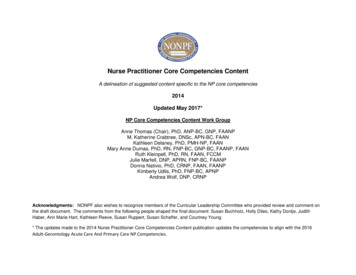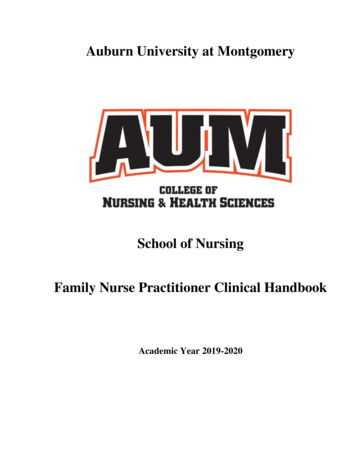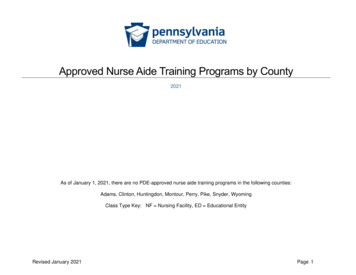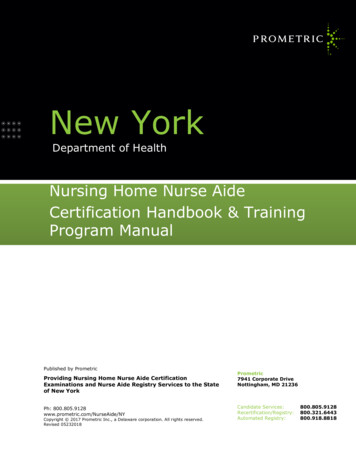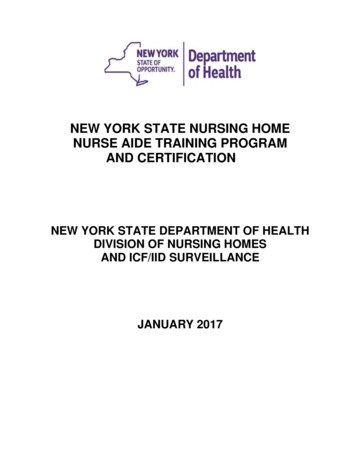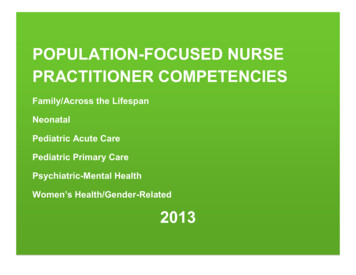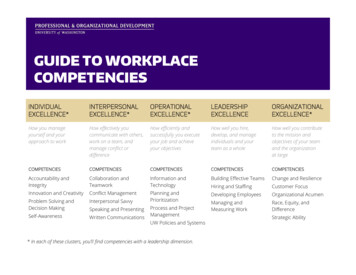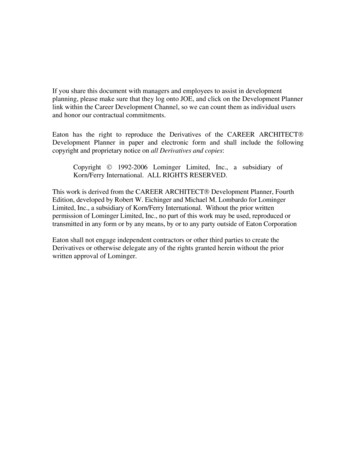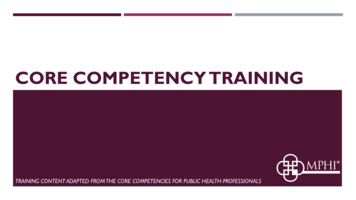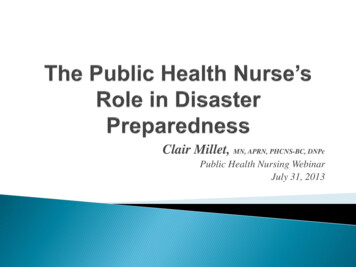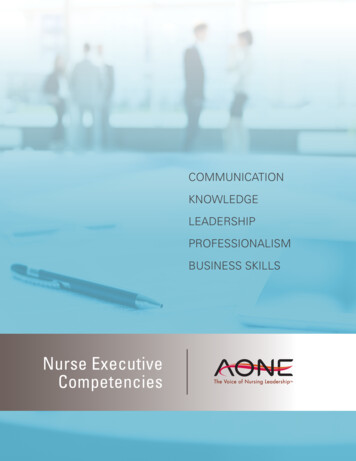
Transcription
INESS SKILLSNurse ExecutiveCompetencies
Suggested APA Citation: American Organization of Nurse Executives. (2015). AONE Nurse Executive Competencies. Chicago, IL: Author.Accessed at: www.aone.orgAccessible at: ncies.shtmlContact: aone@aha.org or 312-422-2800 2015 American Organization of Nurse Executives (AONE). All materials contained in this publication are available to anyone for downloadon www.aone.org, for personal, non-commercial use only. No part of this publication may be reproduced and distributed in any form withoutpermission of AONE, except in the case of brief quotations followed by the above suggested citation. To request permission to reproduce thismaterial, please email aone@aha.org.2AONE NURSE EXECUTIVE COMPETENCIES 2015 The American Organization of Nurse Executives
OVERVIEWNurse Leaders in executive practice setthe vision for nursing practice in thedelivery of safe, timely, efficient, equitableand patient-centered care. Working withina collaborative and interprofessionalenvironment, the nurse in executivepractice is influential in improving thepatient experience of care (including qualityand satisfaction), improving the health ofpopulations and reducing the per capita costof health care.The AONE Nurse Executive Competenciesdetail the skills knowledge and abilities thatguide the practice of nurse leaders in executivepractice regardless of their educationallevel, title or setting. The competencies arecaptured in a model developed in 2004 by theHealthcare Leadership Alliance1 that identifythe common core set of competency domainsfor health care leadership: communicationand relationship management; knowledgeof the health care environment; leadership;professionalism; business skills and principles.Members include American Organization of Nurse Executives, The American College of Healthcare Executives, American Association forPhysician Leadership, Healthcare Financial Management Association, Healthcare Information and Management Systems Society, and MedicalGroup Management Association.1Reliability and validity for the AONE Nurse Executive competencies is established by periodic job analysis/role delineation studies. Thesecompetencies are based on A National Practice Analysis Study of the Nurse Executive (2014).3AONE NURSE EXECUTIVE COMPETENCIES 2015 The American Organization of Nurse Executives
1COMMUNICATION ANDRELATIONSHIP BUILDINGA. EFFECTIVE COMMUNICATION Make oral presentations to diverseaudiences on:»» Nursing»» Health care topics»» Organizational issues Produce written materials for diverseaudiences on:»» Nursing»» Health care topics»» Organizational issues Facilitate group discussions Demonstrate skill in interpersonalcommunicationB. RELATIONSHIP MANAGEMENT Build collaborative relationships Exhibit effective conflict resolution skills Create a trusting environment by:»» Following through on promises andconcerns»» Establishing mechanisms to follow-up oncommitments»» Balancing the concerns of individuals withorganizational goals and objectives»» Engaging staff and others in decisionmaking»» Communicating in a way as to maintaincredibility and relationshipsC. INFLUENCING BEHAVIORS Assert views in non-threatening, nonjudgmental ways Create a shared vision Facilitate consensus building Inspire desired behaviors and manageundesired behaviors4AONE NURSE EXECUTIVE COMPETENCIES Achieve outcomes through engagement ofstakeholders Promote decisions that are patient-centered Apply situational leadership skillsD. DIVERSITY Establish an environment that valuesdiversity (e.g. age, gender, race, religion,ethnicity, sexual orientation, culture) Establish cultural competency in theworkforce Incorporate cultural beliefs into care delivery Provide an environment conducive toopinion sharing, exploration of ideas andachievement of outcomesE. COMMUNITY INVOLVEMENT Represent the organization to non-healthcare constituents within the community Serve as a resource to community andbusiness leaders regarding nursing andhealth care Represent the community perspective inthe decision-making process within theorganization/system Represent nursing to the media Serve on community-based boards, advisorygroups, and task forcesF. MEDICAL/STAFF RELATIONSHIPS Build credibility with physicians as achampion for patient care, quality and theprofessional practice of nursing Confront and address inappropriate ordisruptive behavior towards patientsand staff Represent nursing at medical executivecommittee and other department/medicalstaff committees 2015 The American Organization of Nurse Executives
1COMMUNICATION AND RELATIONSHIP BUILDING Collaborate with medical staff leaders andother disciplines in determining neededpatient care service lines Collaborate with physicians and otherdisciplines to develop patient care protocols,policies and procedures Collaborate to determine patient careequipment and facility needs Use medical staff mechanisms to addressphysician clinical performance issues Address and model appropriate conflictresolution Create opportunities for physicians andnurses to engage in professional dialogue5AONE NURSE EXECUTIVE COMPETENCIESG. ACADEMIC RELATIONSHIPS Determine current and future supply anddemand for nurses to meet the care deliveryneeds Identify educational needs of existing andpotential nursing staff Collaborate with nursing programs toprovide required resources Collaborate with nursing programs inevaluating quality of graduating cliniciansand develop mechanisms to enhance thisquality Serve on academic advisory councils Collaborate in nursing research and translateevidence into practice Collaborate to investigate care deliverymodels across the continuum Create academic partnerships to ensure aqualified workforce for the future 2015 The American Organization of Nurse Executives
2KNOWLEDGE OF THE HEALTHCARE ENVIRONMENTA. CLINICAL PRACTICE KNOWLEDGE Demonstrate knowledge of current nursingpractice and the roles and functions ofpatient care team members Communicate patient care standards asestablished by accreditation, regulatory andquality agencies Ensure compliance with the State NursePractice Act, State Board of Nursingregulations, state and federal regulatoryagency standards, federal labor standardsand policies of the organization Adhere to professional associationstandards of nursing practice Ensure that written organizational clinicalpolicies and procedures are reviewed andupdated in accordance with evidence-basedpractice Integrate bioethical and legal dimensionsinto clinical and managementdecision-making Ensure protection of human subject rightsand safety in clinical researchB. DELIVERY MODELS / WORK DESIGN Demonstrate current knowledge of patientcare delivery systems across the continuum Describe various delivery systems and ageappropriate patient care models and theadvantages/disadvantages of each Assess the effectiveness of delivery models Develop new delivery models Participate in the design of facilitiesC. HEALTH CARE ECONOMICS AND POLICY Understand regulation and payment issuesthat affect an organization’s finances Describe individual organization’s payer mix,CMI and benchmark database6AONE NURSE EXECUTIVE COMPETENCIES Align care delivery models and staffperformance with key safety and economicdrivers (e.g., value-based purchasing,bundled payment) Take action when opportunities exist toadjust operations to respond effectivelyto environmental changes in economicelements Use knowledge of federal and state lawsand regulations that affect the provision ofpatient care (e.g., tort reform, malpractice/negligence, reimbursement) Participate in legislative process on healthcare issues through such mechanisms asmembership in professional organizationand personal contact with officials Educate patient care team members on thelegislative process, the regulatory processand methods for influencing both Interpret impact of legislation at the stateand federal level on nursing and health careorganizationsD. GOVERNANCE Use knowledge of the role of the governingbody of the organization in the followingareas:»» Fiduciary responsibilities»» Credentialing»» Performance management Represent patient care issues to thegoverning body Participate in strategic planning and qualityinitiatives with the governing body Interact with and educate the organization’sboard members regarding health care andthe value of nursing care Represent nursing at the organization’sboard meetings Represent other disciplines at theorganization’s board meetings 2015 The American Organization of Nurse Executives
2KNOWLEDGE OF THE HEALTH CARE ENVIRONMENTE. EVIDENCE-BASED PRACTICE/OUTCOMEMEASUREMENT AND RESEARCH Use data and other sources of evidence toinform decision making Use evidence for establishment ofstandards, practices and patient care modelsin the organization Design feedback mechanisms by which toadapt practice based upon outcomes fromcurrent processes Design and interpret outcome measures Disseminate research findings to patientcare team members Allocate nursing resources based onmeasurement of patient acuity/care needed Monitor and address nurse sensitiveoutcomes and satisfaction indicatorsF. PATIENT SAFETY Support the development of anorganization-wide patient safety program Use knowledge of patient safety science(e.g., human factors, complex adaptivesystems, LEAN and Six Sigma) Monitor clinical activities to identify bothexpected and unexpected risks Support a Just Culture (non-punitive)reporting environment, supporting a rewardsystem for identifying unsafe practices Support safety surveys, responding andacting on safety recommendations Lead/facilitate performance improvementteams to improve systems/processes thatenhance patient safety7AONE NURSE EXECUTIVE COMPETENCIESG. PERFORMANCE IMPROVEMENT/METRICS Articulate the organization’s performanceimprovement program and goals Use evidence-based metrics to align patientoutcomes with the organization’s goals andobjectives Apply high reliability concepts for theorganization Establish quality metrics by»» Identifying the problem/process»» Measuring success at improving specificareas of patient care»» Analyzing the root causes or variationfrom quality standards»» Improving the process with the evidence»» Controlling solutions and sustainingsuccessH. RISK MANAGEMENT Identify areas of risk/liability Facilitate staff education on riskmanagement and compliance issues Develop systems that result in promptreporting of potential liability by staff at alllevels Identify early warning predictabilityindications for errors Correct areas of potential liability Ensure compliance by staff with all requiredstandards 2015 The American Organization of Nurse Executives
3LEADERSHIPA. FOUNDATIONAL THINKING SKILLS Address ideas, beliefs or viewpoints thatshould be given serious consideration Recognize one’s own method of decisionmaking and the role of beliefs, values andinferences Apply critical analysis to organizationalissues after a review of the evidence Maintain curiosity and an eagerness toexplore new knowledge and ideas Promote nursing leadership as both ascience and an art Demonstrate reflective practice and anunderstanding that all leadership beginsfrom within Provide visionary thinking on issues thatimpact the health care organizationD. SUCCESSION PLANNING Develop a leadership succession plan Promote nursing leadership as a desirablespecialty Mentor current and future nurse leaders Establish mechanisms that provide for earlyidentification and mentoring of staff withleadership potential Develop a workforce analysis plan andimplement strategies to ensure an adequateand qualified workforceE. CHANGE MANAGEMENT Adapt leadership style to situation needs Use change theory to implement change Serve as a change leaderB. PERSONAL JOURNEY DISCIPLINES Learn from setbacks and failures as wellas successesC. SYSTEMS THINKING Use knowledge of classic and contemporarysystems thinking in problem solving anddecision making Provide visionary thinking on issues thatimpact the healthcare organization Recognize the contribution of mentalmodels on behavior Promote systems thinking as an expectationof leaders and staff Consider the impact of nursing decisions onthe healthcare organization as a whole Use resources from other paradigms8AONE NURSE EXECUTIVE COMPETENCIES 2015 The American Organization of Nurse Executives
4PROFESSIONALISMA. PERSONAL AND PROFESSIONALACCOUNTABILITY Hold self and others accountable for mutualprofessional expectations and outcomes Contribute to the advancement of theprofession Participate in and contribute to professionalorganizations Demonstrate and promote leader and staffparticipation in professional organizations Promote leader and staff participationin lifelong learning and educationalachievement Achieve and maintain professionalcertification for self Promote professional certification for staff Role model standards of professionalpractice (clinical, educational and leadership)for colleagues and constituentsC. ETHICS Uphold ethical principles and corporatecompliance standards Hold self and staff accountable to complywith ethical standards of practice Discuss, resolve and learn from ethicaldilemmasD. ADVOCACY Promote clinical perspective inorganizational decisions Involve nurses and other staff in decisionsthat affect their practice Represent the perspective of patients andfamilies Advocate for optimal health care in thecommunityB. CAREER PLANNING Coach others in developing their own careerplans Seek input and mentorship from others incareer planning and development Develop a personal and professional careerplan and measure progress Solicit feedback about personal strengthsand weaknesses Act on feedback about personal strengthsand weaknesses9AONE NURSE EXECUTIVE COMPETENCIES 2015 The American Organization of Nurse Executives
5BUSINESS SKILLSA. FINANCIAL MANAGEMENT Develop and manage an annual operatingbudget and long-term capital expenditureplan Use business models for health careorganizations and apply fundamentalconcepts of economics Interpret financial statements Manage financial resources Ensure the use of accurate chargingmechanisms Educate patient care team memberson financial implications of patient caredecisions Participate in the negotiation and monitoringof contract compliance (e.g., physicians,service providers)B. HUMAN RESOURCE MANAGEMENT Ensure development of educationalprograms to foster workforce competenciesand development goals Participate in workforce planning andemployment decisions Use corrective discipline to mitigateworkplace behavior problems Evaluate the results of employeesatisfaction/quality of work environmentsurveys Support reward and recognition programs toenhance performance Formulate programs to enhance work-lifebalance Interpret and ensure compliance with legaland regulatory guidelines Provide education regarding components ofcollective bargaining Promote healthful work environments Address sexual harassment, workplace10AONE NURSE EXECUTIVE COMPETENCIES violence, verbal and physical abuseImplement ergonomically sound workenvironments to prevent worker injury andfatigueDevelop and implement emergencypreparedness plansAnalyze market data in relation to supplyand demandContribute to the development ofcompensation programsDevelop and evaluate recruitment,onboarding, and retention strategiesDevelop and implement an outcome-basedperformance management programDevelop and implement programs to reeducate the workforce for new rolesC. STRATEGIC MANAGEMENT Create the operational objectives, goals andspecific strategies required to achieve thestrategic outcome Conduct SWOT and Gap analyses Defend the business case for nursing Utilize the balanced scorecard analysis tomanage change Evaluate achievement of operationalobjectives and goals Identify marketing opportunities Develop marketing strategies incollaboration with marketing experts Promote the image of nursing and theorganization through effective mediarelations 2015 The American Organization of Nurse Executives
5BUSINESS SKILLSD. INFORMATION MANAGEMENTAND TECHNOLOGY Use technology to support improvement ofclinical and financial performance Collaborate to prioritize for theestablishment of information technologyresources Participate in evaluation of enablingtechnology in practice settings Use data management systems for decisionmaking Identify technological trends, issues andnew developments as they apply topatient care Demonstrate skills in assessing dataintegrity and quality Provide leadership for the adoption andimplementation of information systems11AONE NURSE EXECUTIVE COMPETENCIES 2015 The American Organization of Nurse Executives
3 AONE NURSE EXECUTIVE COMPETENCIES 2015 The American Organization of Nurse Executives Nurse Leaders in executive practice set the vision for nursing practice in the delivery of safe, timely, efficient, equitable and patient-centered c
